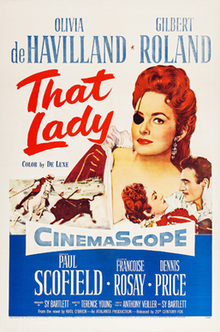That Lady
| That Lady | |
|---|---|
 1955 Theatrical poster | |
| Directed by | Terence Young |
| Written by | Sy Bartlett Based on the novel by Kate O'Brien |
| Produced by | Sy Bartlett |
| Starring | Olivia de Havilland Paul Scofield Gilbert Roland Françoise Rosay |
| Cinematography | Robert Krasker |
| Edited by | Raymond Poulton |
| Music by | John Addison |
| Distributed by | 20th Century Fox |
Release date | 11 May 1955[1] |
Running time | 100 minutes |
| Country | United Kingdom / Spain |
| Language | English |
That Lady is a 1955 British-Spanish historical romantic drama film directed by Terence Young and produced by Sy Bartlett and Ray Kinnoch. It stars Olivia de Havilland, Gilbert Roland, and Paul Scofield.
The film is based on a 1946 historical novel by Kate O'Brien, which was published in North America under the title For One Sweet Grape. It is the story of Ana de Mendoza, a swashbuckling, sword-toting princess. She lost an eye in a duel defending the honour of her king Philip II of Spain, (played by Paul Scofield in his film debut, who earned a BAFTA award for best newcomer). Philip later jilted Ana to marry Mary I, the Queen of England, marrying her off to an aging noble, who died, leaving her a widow. Subsequently, he asks Ana de Mendoza to assist him in tutoring commoner Antonio Perez (Gilbert Roland) as his first secretary, but when they fall in love his popularity starts to drop, helped along by Philip II's jealous minister Mateo Vasquez (Dennis Price).
Shot in England and on location in Spain, the film features Cinemascope footage of the Spanish countryside and renaissance castles. That Lady was an early directorial effort by Terence Young, who went on to direct three James Bond films: Dr. No, From Russia With Love, and Thunderball. Christopher Lee appears in a minor role as the Captain of the Guard.
The novel was also produced as a play in 1949, starring Katharine Cornell as Ana, Henry Daniell as Philip II, and Torin Thatcher as Antonio.[2]
Production
Director Terence Young had tried to interest Greta Garbo in starring in this film, without success. Vivien Leigh was interested, but due to her declining health and tuberculosis, it was impossible to insure her. Olivia de Havilland was the third choice for the film.[3]
Much of the film was shot on location in Segovia, Spain.[3]
References
- ^ https://www.imdb.com/title/tt0048712/
- ^ University of Limerick Special Collections: Kate O'Brien
- ^ a b Higham, Charles (1984). Sisters: The Story of Olivia de Havilland and Joan Fontaine. Dell Publishing. p. 221. ISBN 0-440-17866-5.
